- Home
- Susanna Kearsley
The Rose Garden Page 13
The Rose Garden Read online
Page 13
The minutes passed. My shoulders stiffened, unaccustomed to the damp, and I got up and paced a little in an effort to get warm. I thought for certain that my pacing would wake Daniel in the next room, but the house stayed silent. Finally, after what seemed an interminable time, I raised the courage to cross over to the door between our rooms, and very gently eased it open. If he was in there asleep, I thought, I’d simply close the door again and wait.
But the blue-curtained bed was empty.
Moving cautiously past it, I knocked at the next connecting door, but that room, too, had no one in it. That discovery and the need for movement made me bolder, and in time I had repeated the manoeuvre with the other upstairs rooms, and then with those downstairs, and found that, for the moment, there was no one in the house but me.
I might have gone outside to see if they were there, but I remembered Daniel saying clearly that it was not safe for me to leave the house, and I agreed. I really didn’t want to meet the constable alone.
The problem was, it had been a while now since I’d woken up at Claire’s and come away without my breakfast, a decision I regretted now. It wasn’t just the food – I could go hungry for a while with no real ill effects – but I had never coped too well with thirst. The more I tried ignoring it, the deeper it took hold, and if I didn’t find some water soon I knew I’d get a headache.
I’d seen Fergal dipping water from a pail beside the kitchen hearth, but when I checked the pail I found it empty. I stood frowning for a moment till a blast of rain against the kitchen window gave my thoughts a jolt. Taking the pail with me, I went to open the back door and set the pail out in the rain. It took several minutes before I’d collected enough for a small drink of water, but that was enough. With my thirst partly satisfied, I put the pail back outside to get more, just in case I got thirsty again before Daniel or Fergal came back.
They’d be back soon, I thought. They had left the doors open, and surely they wouldn’t have done that unless they’d been somewhere close by. In the meantime I felt sure they wouldn’t begrudge me a handful of food.
And a handful of food was the most I could find in the scullery. One of the sacks held the barley that Fergal had used for his broth, but uncooked it was hard and inedible, and in the other sack there was just coarsely ground flour. I found two soft apples in one corner of an otherwise empty box under the worktable, but all the other food must have been in the tall cupboard, and that was locked.
I ate one apple, saving the other for later, and went in search of something that would help me pass the time.
It felt strange being in that house with no one else around. I wasn’t used to it, and even with the wind and rain Trelowarth had a multitude of voices – stairs that creaked with no one on them, joists that settled with a sigh, and unseen mice that scrambled through the walls with tiny, furtive noises.
What had Daniel’s wife done on the days he was at sea, I wondered? True, she would have likely had the house to keep and clean, and meals to make, if only for herself. And housework might have filled her waking hours with no time left for boredom. But for me this was a foreign country, really, coming from a place where I could flip a switch and instantly have music or the hourly news to chase away the loneliness.
I wondered whether Daniel’s wife had ever gone upstairs, as I did now, to seek the comfort of the study where the fragrance of his pipe smoke lingered as though he were not far off. I scanned his books in search of something I might know. The books themselves were lovely things to look at, bound in half-calf leather so the scent of them alone enhanced the beauty of the room. Some had their titles stamped in gilded printing on the spine, and curious, I picked out a copy of Jonathan Swift’s poems, so recently printed that I could still smell the sharp scent of fresh ink on the pages. As I read the satirical lines I was struck by the strange realisation that Jonathan Swift was alive right now somewhere and walking around, maybe forming ideas for Gulliver’s Travels, a book that he hadn’t yet written.
Now I’d noticed it, several of the books in this room were by writers who would have been very much alive in 1715: Alexander Pope, and William Congreve, and the poet Matthew Prior. It was thrilling just to hold those books in the same form in which the authors would have held them, in what likely were the first editions published, with their covers smooth and new and all the pages crisply cut.
I wondered how the writers would react were I to tell them that a woman living in this house three hundred years from now would know their names, and still be reading what they’d written.
Putting back the Swift poems I chose instead a folio of Shakespeare’s plays, and flipped through till I found The Merchant of Venice, the first play I’d ever seen on the stage, when my parents had taken Katrina and me up to Stratford as children. Katrina had always said that one performance had started it all for her, switched something on deep inside her that told her that acting was what she was meant to do, what she’d been made for.
I settled myself in the chair by the window, and passed the next hour or so quietly reading. It carried me back, as so many things did. I could almost imagine Katrina beside me, the two of us there in the dark of the theatre and lost in the magic the actors were weaving with just a few props and their voices. Of course it had helped that the young actor playing Bassanio had been so hugely good-looking that right from the opening scene, when he’d leant on a railing directly above us bemoaning his fate, he’d commanded our sympathy.
It had likely been his fault, as much as the play’s, that Katrina had taken up acting. She’d met him in person once, years later, making a film, and had been unimpressed. ‘A walking ego,’ she had called him, when she’d come round to my place that evening as she sometimes did after a long day’s shooting, to relax.
I’d made brown sugar sandwiches, my mother’s bedtime specialty, and asked her, ‘Really?’
‘Really. And to think, for all these years he’s been a fantasy of mine. I guess it’s true, you should be careful what you wish for.’
I could hear her voice within my head again now, though I didn’t need the warning. I already knew it to be true. I’d just come halfway round the world myself in hopes that at Trelowarth I could touch the past and hold what I had lost a little longer, and now here I was. I’d touched the past all right, but I had missed Katrina by three hundred years, and in this strange place I felt more alone than ever.
Evening came, and brought the realisation that I might be on my own for longer than I’d thought. I’d had to leave the study and the books with some reluctance and come back downstairs. The darkness here could not be held at bay by switching on a light, and though the house had no shortage of candles they had to be lit to be useful. Besides, since I’d now eaten the last apple, if I didn’t want to starve I’d have to find a way to somehow cook the barley. I would have to light a fire.
The iron grate inside the kitchen fireplace had a dusting of cold ashes underneath, but it already held a stack of fresh wood waiting for a flame. Except I wasn’t good with fires. Not even with a modern box of matches, which I didn’t have to hand, although a quick search of the crannies near the kitchen hearth produced a metal tinderbox, the kind I’d only read about in books. I knew the theory of the tinder-box: I was supposed to take the flint and steel and strike some sparks onto a small pile of the tinder, in this case a mixture of wood shavings and bits of cloth. When the sparks caught on the tinder I was then supposed to blow on them and coax them to a flame that would in turn ignite the wood stacked in the fireplace. Foolproof.
Only this was me, and after working at it for what felt an hour I’d only managed to produce a few small sparks that flashed and smouldered and did no more than consume my precious scraps of tinder before burning out completely in a listless puff of smoke. My face was smudged, my temper frayed, my knees were stiff from kneeling at the hearth, but I’d been born too stubborn to let such a small thing beat me, so I focused all my concentration on the task and shut out everything around me that mig
ht serve as a distraction – every creak and groan the house made, and the rattle of the storm against the windows, and the wailing of the wind across the chimney-top above me.
And the door. I didn’t hear it, either, so the sudden heavy tread of boots behind me on the floorboards made me jump. I turned, expecting Daniel. Maybe Fergal.
It was neither.
CHAPTER FOURTEEN
In the near-dark of this room the silent presence of the constable was something to be feared. My one advantage was that I had caught him off his guard as well – he clearly hadn’t been expecting to find anyone at home.
I stood with care, and tried to calm my racing heartbeat with determination.
He recovered first. ‘Mistress O’Cleary.’ There was no attempt to make even a mocking bow this time, no need to show respect since there was no one watching. Those cold, uncompromising eyes grew narrow as he processed this discovery. ‘Have they left you here alone for these past days?’ His gaze moved briefly to the hearth and back. ‘And with no fire. That was unkind of them. I confess when I did not see smoke from the chimneys I was myself convinced the house was empty.’
So that was why he’d come in unannounced like this – because he’d thought he could. He’d thought there would be no one here to notice or to challenge him, and that he would be able to poke round at leisure, undisturbed.
Except I’d spoilt his plans.
Now, like some reptile who could change the pattern of his skin when needed, he appeared to be adapting to this new twist of events. I saw his features lose a little of their hardness in a calculated way, and when he spoke again his voice made a deliberate stab at being civil. ‘Are you having difficulty?’
It was just as well that I was scared of him, because that fear prevented me from answering for long enough that I remembered I was not supposed to have a voice. I gave a wary nod.
‘Stand aside then.’ He did not appear to notice that my fingers shook a little as I passed the tinder-box into his outstretched hand. It took him time as well, but in the end he made a fire that grew steadily upon the hearth and cast a welcome light and spreading warmth into the dreary room.
When he straightened, it took all my effort not to take a backwards step away from him, because he seemed too close. ‘Now, how then will you thank me for my aid, when you have not the use of words?’ He saw my wariness increase, and seemed amused enough by it to push my panic button further, giving me a purposefully slow once-over, pausing on my loose hair. ‘I can see you were preparing for your bed. Perhaps you need assistance there, as well?’ He smiled at my reaction, and then went another route. ‘But no, some wine, I think, will be enough. A bottle of the best that Butler has and you may count your debt repaid.’
I stood a moment at a loss, until I suddenly remembered there had been wine in the dining room when we had eaten lunch there – several bottles lying dusty in a corner near the sideboard. I had no idea whether they were Daniel Butler’s best or not, but that’s what he’d been drinking so the wine would not be bad.
I gave a small nod to excuse myself and hustled off in that direction, hoping that the bottles would still be there. And they were. I grabbed the top one, wiped the dust off with my hand and took it back to give to the constable, in hopes that would get rid of him.
He wasn’t where I’d left him in the kitchen. Apprehensive, I stood still beside the hearth a moment, listening. He wouldn’t have gone far, I knew. I’d only been a minute. But I also knew his aim in coming up here in the first place must have been to look around, and he was obviously taking full advantage of my absence.
Then I heard him. In the scullery.
My mouth went dry so suddenly I found it hard to swallow down the nervous lump that lodged itself above my heart. My jacket and my boots were in the scullery, and if he found them …
I could feel my fingers clenching round the bottle’s neck so tightly that my fingernails were digging in my palm as I went through into the scullery to join him. To my great relief, I saw that he had not yet moved the sacking on the floor. His interest seemed to be directed at the pantry cupboard with its lock.
‘Tell me,’ he asked idly, ‘does your brother always lock the food away when he does leave you on your own?’ His glance toward me held no expectation of an answer, but his eyes were watchful on my face for my reaction. ‘Or might there be more in here than food?’
I kept my own face neutral, trying hard not to react at all, not even when he walked towards the sacking. But he only kicked it to one side and reached for a short-handled axe that leant against the wall behind. I hadn’t even known the tool was there, myself. The constable had sharper eyes.
‘We must not let you starve,’ he said, with mock concern. He brought the axe down with a force that broke the locked door cleanly and the cupboard swung wide open.
I hadn’t been too sure, myself, what he might find inside. For all I knew there might be contraband behind the food, but after he had opened the few tins and shoved some sacks aside, he muttered something to himself and stood a moment, thinking. Then he turned his head and looked at me.
I really didn’t like his eyes. They made my flesh crawl cold.
He’d thought of something, I could see it in the way his mouth began to curve. He asked me, ‘Are you in the house alone?’
And how was I to answer that? He obviously knew that Daniel Butler and the rest were gone away somewhere, and if there had been anybody here with me I wouldn’t have been trying on my own to light the fire. No matter how much my protective instincts warned me not to give a truthful answer, I knew full well that I wouldn’t fool him if I lied. I gave a slow nod.
‘Well then, I do think it would be wise were I to make a full inspection of this house and all its rooms, that I might satisfy myself as to your safety.’
There was nothing I could do to stop him anyway, but still he’d picked a clever way to word things so that neither I nor anyone could argue his intentions.
He carried the axe with him out of the scullery and when I followed he turned round and using the blade, pointed back at the kitchen. ‘No mistress, wait there. I would do this alone.’
He was gone for a long time. Long enough for me to think about escaping to the stables or the woods, but with the storm outside it seemed a foolish thing to do, and anyway my fear was slowly melting into anger at his arrogant intrusion, and a part of me refused to give him any satisfaction, so I didn’t run. Whatever happened, I’d at least be able to tell Daniel what the constable had done. And what he’d found.
With the wind at the window I couldn’t hear what he was doing upstairs, though. I didn’t know what he was touching, defiling. It was, I thought, rather like having a rat roaming unseen behind your walls, doing its damage.
I was happy to see, when he came back down, that his hard face had the look of frustration, as though he’d been cheated. Clearly he hadn’t found what he’d been looking for.
Passing the scullery door he stopped briefly to throw down the axe he was holding. It fell with a clatter and thud on the flagstones. ‘Well, Mistress O’Cleary.’ His tone was a challenge. I saw his gaze fall on the bottle that I was still holding. ‘Would that be my wine? Give it here, then.’
Heavily he sat beside me, took a small knife from his pocket and pried out the seal, and then took a long drink from the bottle itself. And another. Then wiping his mouth on his sleeve he said, ‘It may be that I am approaching this wrongly. Perhaps I have only to ask, hm?’ He angled his head and his eyes fixed themselves on my own. ‘Have you had any visitors here to Trelowarth of late? Any men of high birth?’
Very carefully, I shook my head.
‘You would do well to tell me the truth, mistress, for I remind you that this country’s laws of high treason can give no protection to those who might shelter a traitor.’ His voice held a velvet contempt as he added, ‘Nor even for those who would take one to bed.’ His glance flicked down my length and back as he drank deep from the bottle again, and when I fai
led to react to the insult he said, ‘Do not flatter yourself that he holds you in any regard. Do you know why he gives you that gown? To give life to a ghost. Any whore could fulfil the same purpose.’
His smile had the power to cut just as cruelly as that small knife he’d used to open the wine, and that he now put back in his pocket. He stood. ‘Think on that, while you seek to protect him from justice. I am not myself without mercy, you’ll find, but I can do nothing to help you if you put the noose round your neck by your own choice.’ Setting down the bottle on the table, he said, ‘Take you good care of that fire I have made for you, Mistress O’Cleary. ’Twould grieve me to see you get burnt.’
I did not stand myself, nor look round as he left. The truth was that I’d started shaking too badly to stand. It was only the after-effect of the fear I had felt while he’d been here, my body’s release of the tension I’d had to hold in, and no more. But in spite of the fire that now crackled so warm on the hearth it was some time before I stopped shaking, and even when I finally stood I still felt cold inside.
The wine that he’d left on the table might have helped warm me, but I didn’t want to drink from any bottle he had held. It was as though he had a poison in him that was transferred by his touch and needed to be cleaned away. I took the bottle in my hand and carried it around to the back door where I upended it above the muddy ground.
And then I tilted my face to the rain until I felt clean, too.
The bucket I’d set out before was now half full. I brought it in and locked the door, then hauled the three-legged iron kettle to the hearth and emptied most of the water into it, saving some for drinking later. I’d lost my appetite, but knowing that my hunger would return and that I needed to keep eating to survive till someone came, I sifted barley from the sack into the water and I left it there to boil while I lit a candle and went up to see what damage the constable had done.

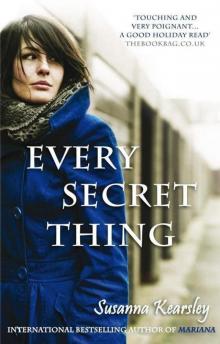 Every Secret Thing
Every Secret Thing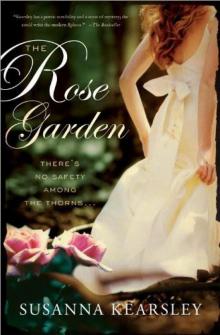 The Rose Garden
The Rose Garden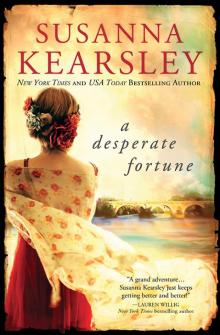 A Desperate Fortune
A Desperate Fortune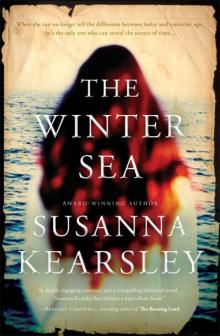 The Winter Sea
The Winter Sea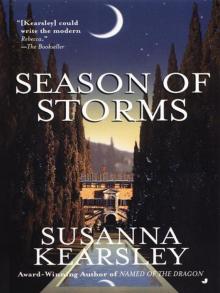 Season of Storms
Season of Storms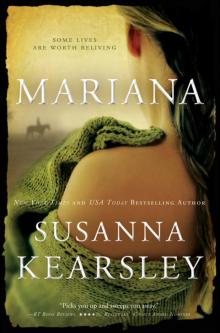 Mariana
Mariana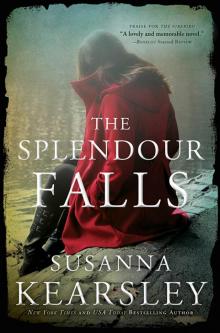 The Splendour Falls
The Splendour Falls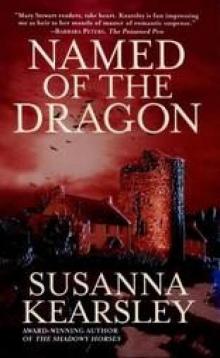 Named of the Dragon
Named of the Dragon Sophia's Secret
Sophia's Secret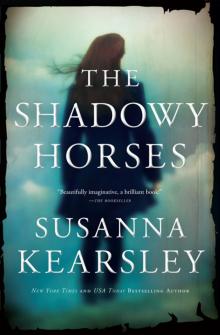 The Shadowy Horses
The Shadowy Horses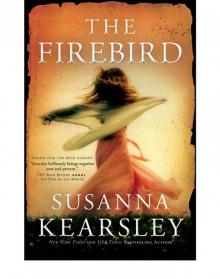 The Firebird
The Firebird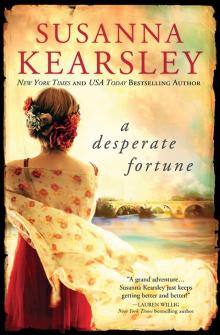 Desperate Fortune
Desperate Fortune